Most gardeners would agree finding the best garden trowel is essential and one of their most reached-for garden tools. A useful little handheld spade, garden trowels have a myriad of uses including digging small holes, filling plant pots, transplanting seedlings, and weeding.
Your traditional trowel is capable of all of the above, but there are specialist trowels that make some of those jobs that little bit easier. For example, potting trowels have a deeper, more curved blade to help fill plant pots, and narrow Dixter trowels are brilliant when you're working in small spaces.
Best garden trowels at a glance:
• Best traditional trowel: Spear & Jackson Elements Hand Trowel - View on Amazon UK
• Best for transplanting: Draper 14312 Carbon Steel Heavy Duty Transplanting Trowel - View on Amazon UK
• Best for potting: Kent & Stowe Stainless Steel Hand Potting Scoop - View on Amazon UK
A minimum of one garden trowel is an absolute must-have for any kind of gardener, but you may be tempted to invest in a specialist tool too. To ensure you're properly tooled up for your next gardening task, whatever that may be, take a look through our savvy selection of the best and most useful garden trowels currently available.
Best trowels for your gardening tasks
Best traditional trowel
 Modern Gardens
Modern Gardens This classic garden trowel, from Spear & Jackson's popular "Elements" range of garden tools, is a budget-friendly option that offers robust specifications.
It has a hammer finish, epoxy-coated head which S&J says improves resistance to rust, scratches, humidity, and alkalines in the soil. The ash wood handle has been weatherproofed and there's a handy leather hanging hook for storage.
Tried and tested by Modern Gardens Commerce Content Writer Amy-Mae Turner: "This Spear & Jackson hand trowel feels much more substantial than its price tag would suggest. The carbon steel blade is weighty, I found this made it efficient at cutting through stonier soil and digging out stubborn roots. The epoxy coating gives the textured finish a slight shine, and means that most dirt will come off with quick rinse.
The ashwood handle is comfortably-shaped and feels very firmly attached to the blade. I tried prising up some heavy stones in my rockery, just to test the strength, and the trowel was unaffected. The wood has been given a weatherproof coating, but I wouldn't risk leaving this out in all weathers. The leather hanging hook is a nice touch for simple storage, although could be longer.
This trowel has quite a blunt point and is fairly wide, measuring 8cm at the blade's base, so would not be suited to transplanting delicate seedlings, but that's not what it's made for - it is a hand trowel I'd recommend for for general, everyday garden tasks. After testing this 'Elements' trowel, I wouldn't hesitate to consider other garden tools in the 'Elements' range."
Pros
- Epoxy-coated head for protection
- Lacquered handle with a handy leather strap
Cons
- Some users feel the blade is a little heavy
Best for transplanting
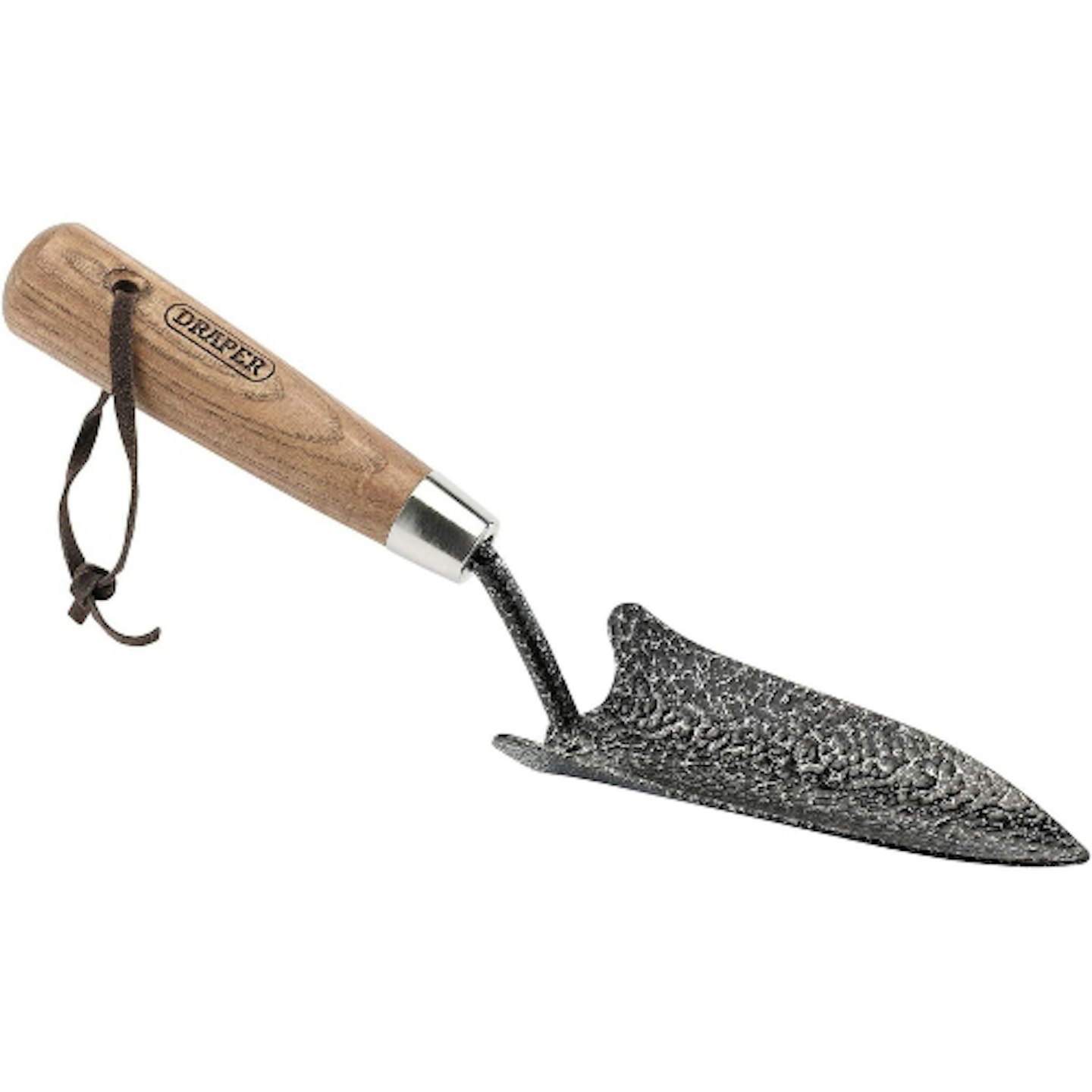 Draper
DraperAs the name would suggest, transplanting trowels are used for digging, then introducing seedlings and transplants into the space you've created. The longer, narrower blade with a distinctive curve makes this process easier.
This Draper transplanting trowel is a robust option, boasting a fully hardened and tempered carbon steel blade, a plated ferrule for sturdiness, and a handsome lacquered ash handle.
Pros
- The blade is made from tempered carbon steel
- Attractive lacquered handle
Cons
- Not a full tang blade
Best for potting
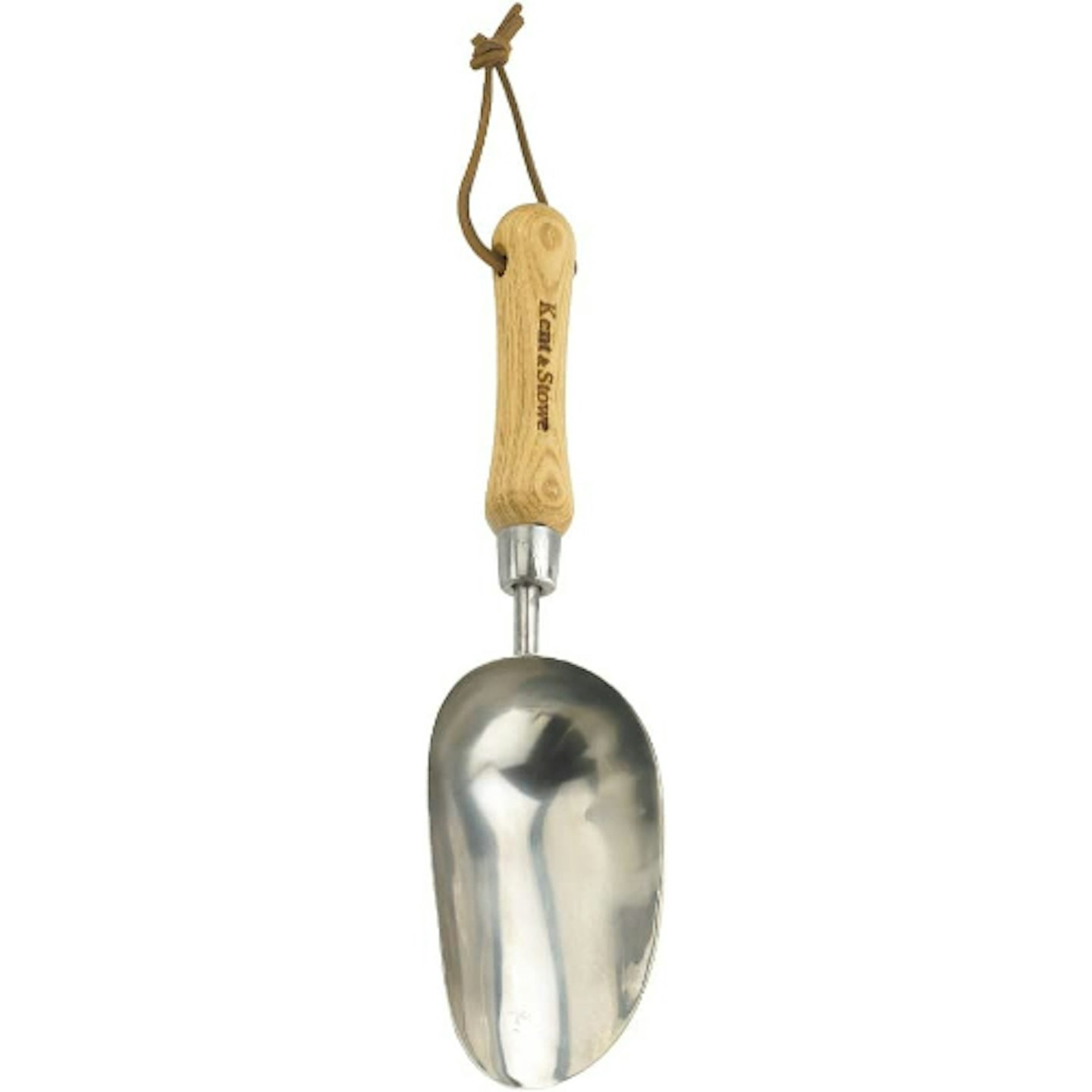 Kent & Stowe
Kent & StoweA scoop has wider uses than simply potting, it can also be used for distributing dry animal food and filling bird feeders. As far as gardening goes, this scoop has a generous curved design that makes putting compost into pots, containers, planters, and hanging baskets a simple task.
This Kent & Stowe potting trowel has a rust-resistant stainless steel head and a comfortable, contoured handle crafted from ash wood.
Pros
- Curved scoop that offers myriad uses
- Made from rust-resistant stainless steel
Cons
- Not ideal for digging
Best with measurements
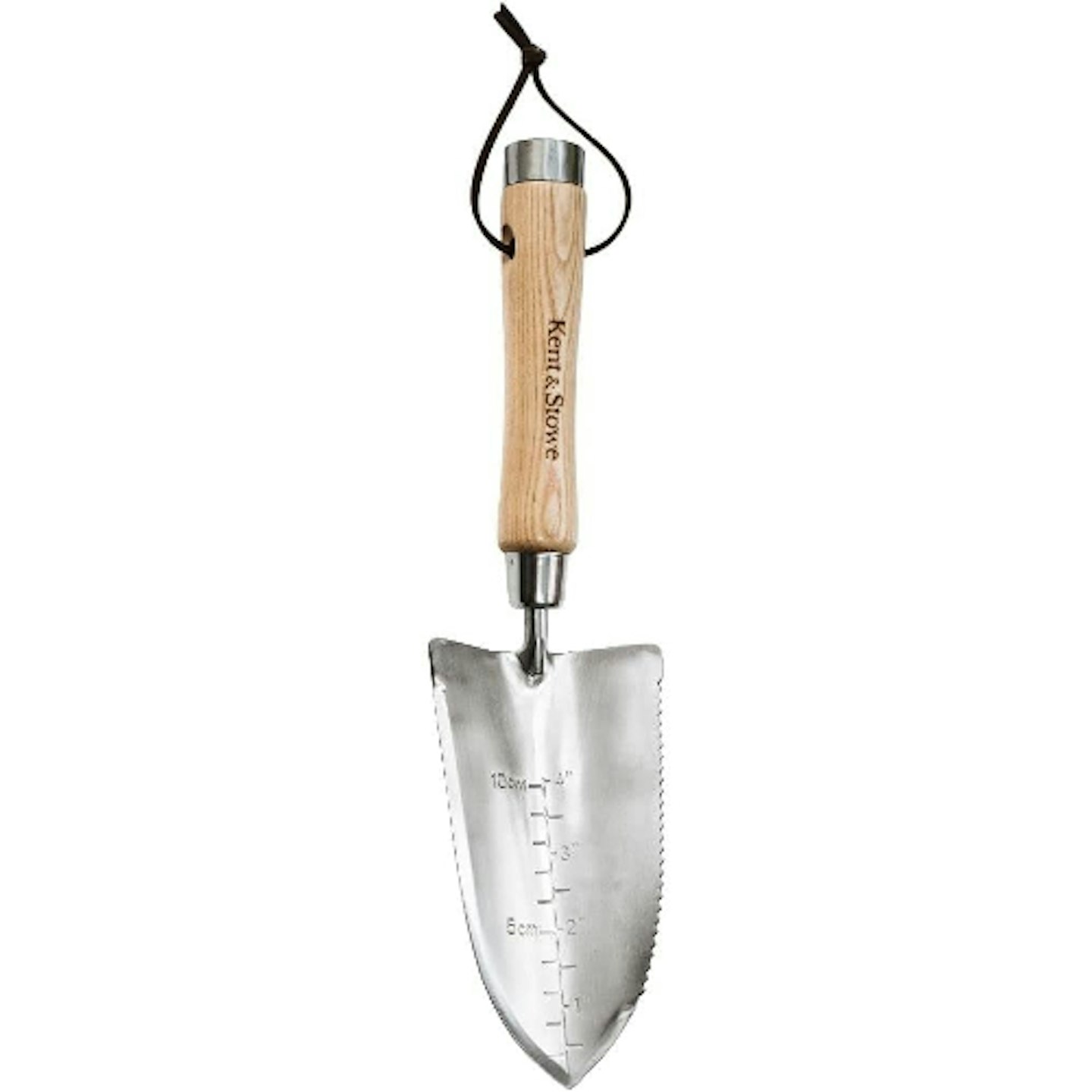 Kent & Stowe
Kent & StoweThis humble trowel was inspired by Capability Brown, one of England's greatest gardeners, so you know you're following in the footsteps of greatness when you're using it.
This is shaped like a traditional trowel but has some useful extra features. This includes a pointed tip to break through hard ground, a serrated edge to cut through roots, a handy planting depth scale, and a metal-tipped handle that can be used as a hammer.
Pros
- Useful depth scale for planting precision
- Serrated edge and a hammer handle
Cons
- Handle is not weatherproof
Best Dixter trowel
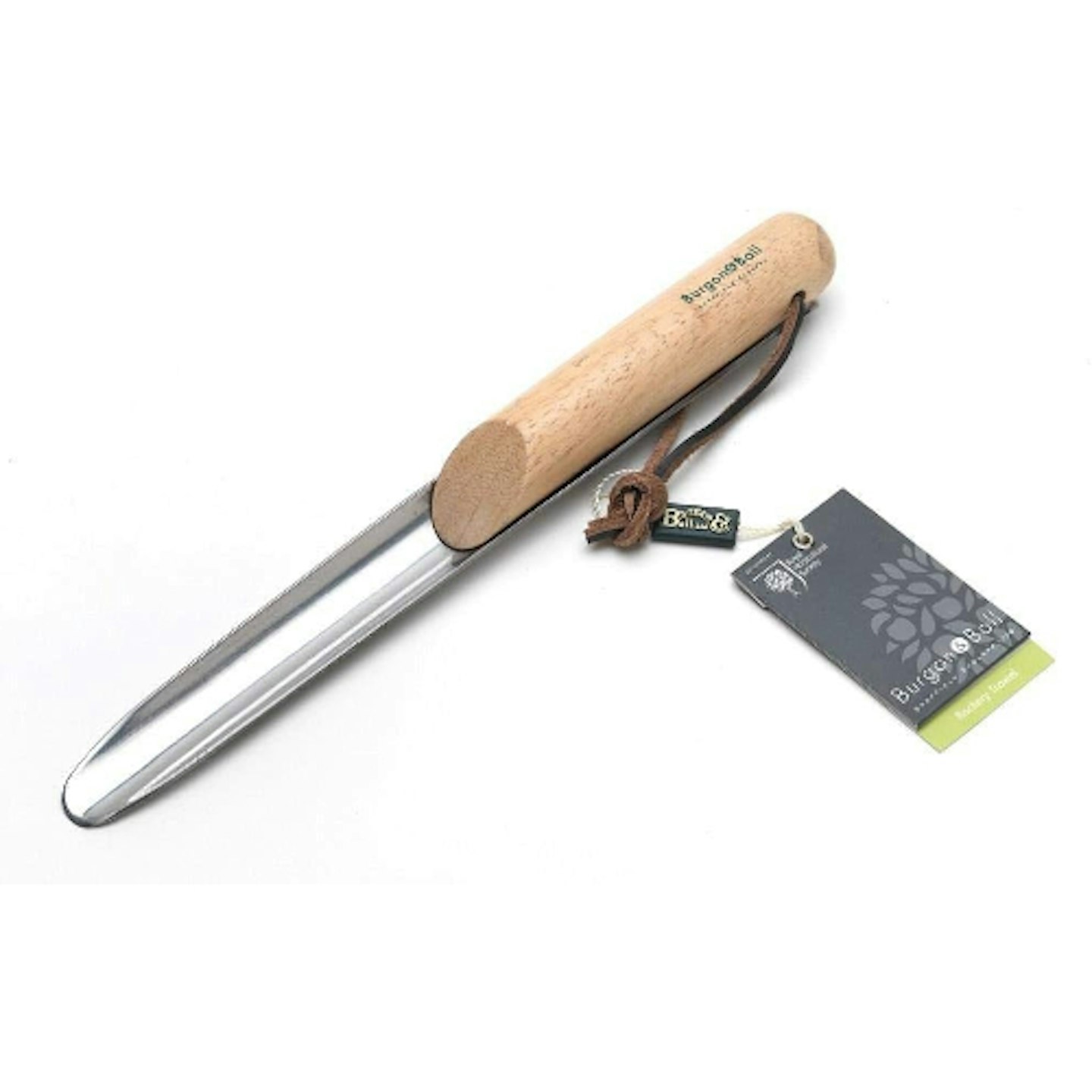 Burgon & Ball
Burgon & BallAnother tool with an interesting provenance, the "Dixter" trowel was originally designed by Christopher Lloyd, head horticulturist at Great Dixter House in East Sussex.
This narrow-bladed trowel is similar to a widger, and it's also known as a rockery trowel as its thin dimensions make it ideal for working in tight spaces. This RHS-endorsed version has a strong, stainless steel blade that extends the entire length of the tool.
Pros
- Durable and strong stainless steel blade
- Full tang construction for strength
Cons
- Specialist use
Best telescopic trowel
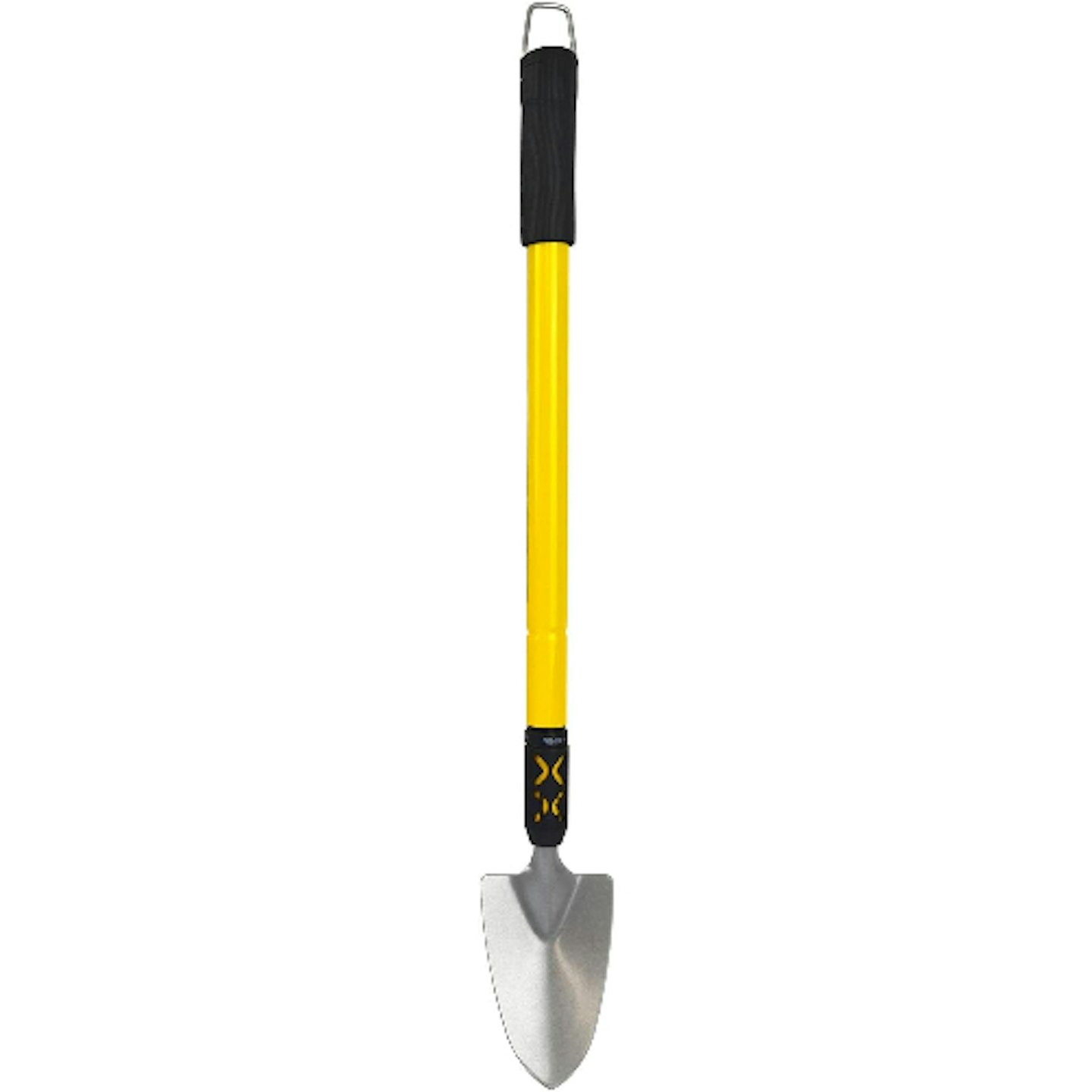 AB Tools
AB ToolsA telescopic trowel's extendable abilities can come in useful if you're trying to tend to hard-to-access areas of your garden. Its long handle can also help anyone with mobility issues who finds getting on and off their knees a challenge.
This capable option from AB Tools measures 63.5cm when collapsed, but when extended with the twist-lock action, can reach to 95cm. This has a stainless steel blade and a foam-coated handle.
Pros
- Extendable design thanks to the telescopic handle
- Stainless steel blade for durability
Cons
- Not all reviewers rate the foam handle
Best tulip trowel
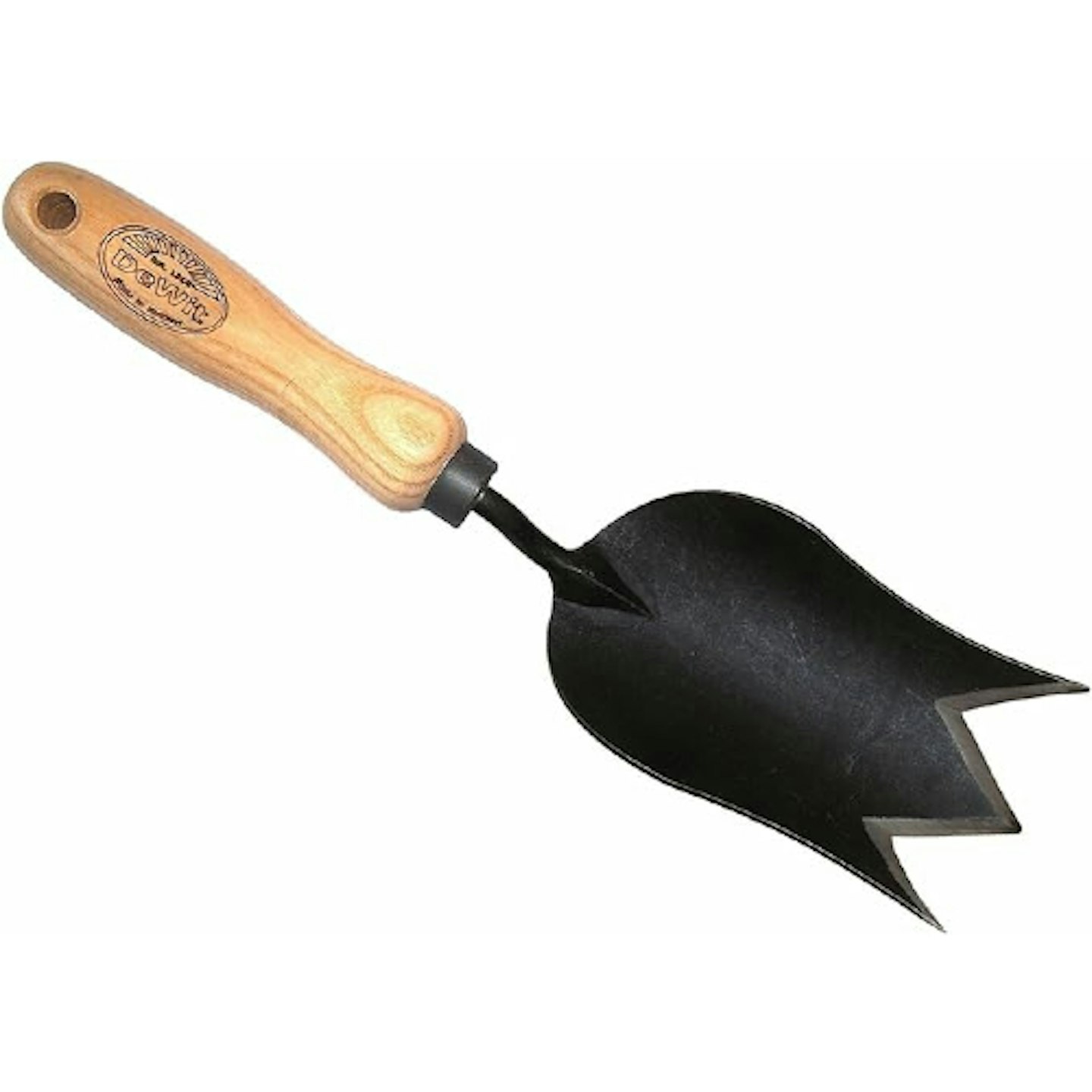 DeWit
DeWit www.crocus.co.uk
Obviously named after the iconic Dutch flower, a tulip trowel is the ideal choice when working on hard ground. It works like a traditional trowel, but thanks to that zig-zag edge, can break up soil like a hand fork.
This DeWit option is crafted from hardened boron steel that has been heat-treated for extra strength, and the three points have been sharpened for improved cutting action. This has an FSC-certified ash wood handle.
Pros
- Zig-zag edge to better break up soil
- Made of heat-treated boron steel
Cons
- No hanging hook supplied
How we chose the best garden trowels
All of these garden trowels have been hand-selected by our team of Modern Gardens shopping experts. We carefully considered the design, functionality, and usability in our selection of the best. Our team has spent hours investigating and researching trowels to make it easier for you to find the very best, and we'd never recommend a product we don't believe in.
Where possible, we also test and share the latest and best products you should know about. And with help from Modern Gardens Magazine, Garden News and Garden Answers, we share expert gardening knowledge to help you get the most from your product.
What to consider when choosing a garden trowel
While trowels are arguably relatively straightforward garden tools, there are a few important qualities to consider when you're shopping for a new one. We're sharing some expert advice from Modern Gardens contributor Geoff Hodge to give you the low-down.
Blade - the shape of the blade will dictate what the trowel is useful for. Narrow blades are good for transplanting and weeding in tight spaces, wider blades have more general usage.
"Your main choices are between carbon steel or stainless-steel tool heads," explains Hodge. "Carbon steel is slightly heavier and may rust if you don't clean, dry, and oil it regularly, while stainless-steel tools are lighter and easier to keep clean."
Handle - "Wooden handles are the traditional choice, usually made from ash, but can produce blisters," warns Hodge. "Soft rubber handles tend to be comfier and easier to use, often ergonomically designed and contoured with finger grips and sometimes a thumb stop at the end, which helps you apply more force when needed."
whether you prefer traditional wooden handles or practical plastic options, look for ergonomic designs that will be more comfortable to use over long periods.
Length - "Regular-length handles are great for potting up and pottering in your raised beds, but if you’d rather not kneel down or have to reach to the back of borders, then there are mid-length and long-handled trowels too," states Hodge.
Ferrule - this is the ring that connects the trowel's blade, or head, to the handle. Metal ferrules are generally stronger than plastic to avoid your trowel snapping.
Storage - most trowels will have a hole in the base of the handle so that can suspend them for storage in order to keep them clean and dry when they are not in use.
How to look after your garden trowel
As with all tools, you should take good care of your garden equipment. A solid maintenance routine will see your trowel last longer, meaning you won't need to replace them too often.
Cleanliness is the key to trowel care. After each use, brush off debris with a stiff brush as this can cause even carbon steel to rust. If there is still residue after a good brush, you can give your tools a quick blast under the garden hose or a brief wash with soapy water.
Your trowel's wooden handles will benefit from occasional treatment - a swift coat of varnish, for example, after you've rubbed it down with some fine sandpaper. You can also oil the metal blade of your trowel to keep it pristine. A multi-purpose oil or spray will protect against rust.
You may want to sharpen any blade's edge with a sharpening stone, although do be aware of the safety implications of having recently sharpened tools around the place.
The final point to note is where to store your tools. A dry tool shed, garage, or greenhouse is ideal. If you can suspend your tools from hooks, keeping them off cold and damp ground, it's advised.
What to read next:
Stylish and practical ankle wellies for gardening and walking
Subscribe to Modern Gardens magazine and get the most out of your outdoor space. Discover everything you need to know to make your outside space look fantastic, quickly and easily, with hundreds of simple ideas, designer tricks, affordable products and expert advice in every issue of Modern Gardens. View our latest subscription offers to save on shop prices.
Amy-Mae Turner is a Commerce Content Writer for Modern Gardens, Yours, Take A Break Pets, and A Modern Kitchen. When she's not pottering in the garden or mucking around in the kitchen, she can be found having doggy cuddles with her two beloved cockapoochis.
